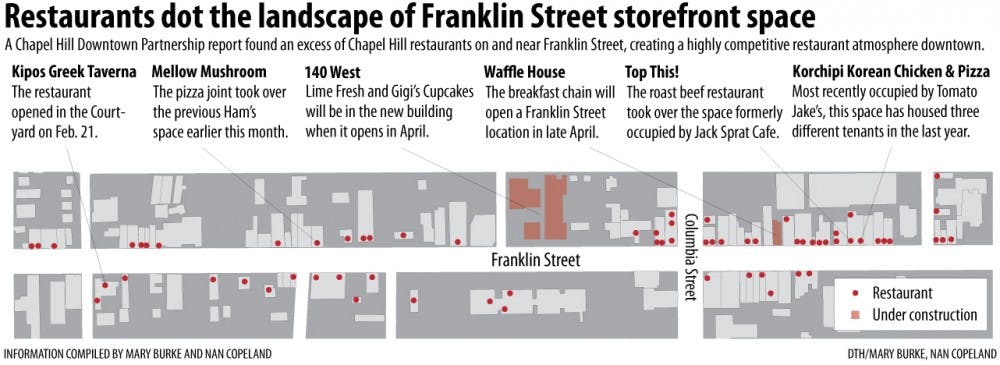Bobby Funk, assistant director of the partnership, said the study showcases Chapel Hill’s strengths in attracting certain types of businesses.
He said the partnership advocates for types of businesses that have the potential to thrive on Franklin Street.
“It’s largely the notion that we do food really well,” Funk said.
In addition to restaurants, downtown retail types with a higher supply than demand included office supply stores, florists and book and music stores.
The study identified several business types downtown lacks, including general merchandise and grocery stores. Other specialty stores such as sporting goods, shoes and jewelry stores were found to be in low supply.
Kyle Vangel, a senior analyst at HR&A Advisors and former UNC graduate student, helped conduct the study.
He said diversifying downtown business would draw more customers into the area.
Vangel said this would aid existing businesses by keeping potential customers from leaving downtown in search of more retail options.
Glen Gordon, owner of Tomato Jake’s Pizzeria at Southpoint and former owner of the recently closed Franklin Street location, said diversifying the downtown business market would foster a larger consumer base.
“If you want to attract more, different people, you have to attract different businesses,” he said.
Dwight Bassett, economic development officer for Chapel Hill, said businesses downtown do need to be more diverse.
But Bassett did not link the lack of diversity with the recent closures of a few iconic Franklin Street restaurants.
To get the day's news and headlines in your inbox each morning, sign up for our email newsletters.
Longtime Franklin Street restaurant Pepper’s Pizza closed its doors on March 4, citing declining business. Jack Sprat Cafe also unexpectedly closed in October after eight years on Franklin Street.
“We have always had turnover, we will always have turnover,” Bassett said. “I think what we’re seeing is nothing more than part of that (business) life cycle.”
Competition from UNC
While a lack of retail diversity might be hurting downtown, many Franklin Street businesses attribute recent woes to their biggest competitor for student customers — UNC.
Gordon said he had to sell his Franklin Street location due to a lack of revenue. He also said an increase in the quality of on-campus food services in the past few years has played a large role in the restaurant closures on Franklin Street.
“We had to sell her because we were losing money,” he said.
Hansel said competition to bring in student customers is increasingly difficult.
“Yes, it is hard to compete with other restaurants — especially ones that are geared towards a student population because on Franklin Street, you need to cater towards students,” he said.
Emily Hansel, a former worker at Squid’s Restaurant, and the wife of Spanky’s General Manager Drew Hansel, said the addition of chain restaurants to on-campus dining has kept students on campus for meals.
“Kids are like, ‘Oh, I eat at that restaurant at home and here is a little version of it that I can eat of it at school’,” she said.
Scott Myers, director of food and vending for UNC, said he does not believe campus dining is negatively affecting Franklin Street restaurants. He said most students live off campus and on-campus residents are not required to have a meal plan.
“Everyone just wants to serve their customers the best they can,” he said.
Contact the desk editor at city@dailytarheel.com.




